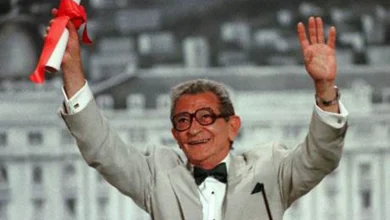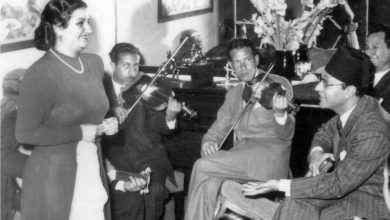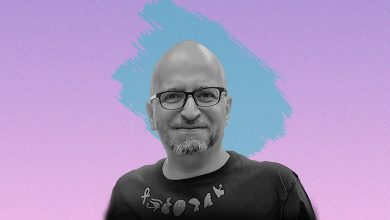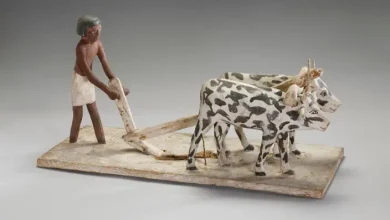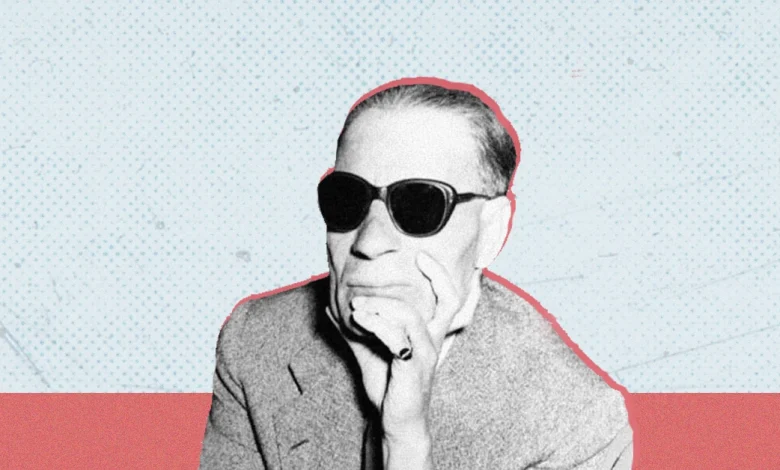
The Sons of Taha Hussein
One day, a group of young writers proclaimed, “We are a generation without teachers,” expressing their rebellion and departure from the norm. However, their cry fell on deaf ears, as it failed to resonate widely. All eras and cultures have recognized the relationship between the teacher and the student, the disciple and the recipient. The bond that is formed is not one of subordination and submission, but one of equality and dialogue.
Such was the era of the Dean: some students became companions at the university, while others became neighbors outside the university. In her book “Memories of Taha Hussein,” Suhair al-Qalamawi recounts: “I borrowed the title of this book from you, ‘Memories of Abu Al-Alaa’. How much I have learned from you in your lifetime, and how much I will continue to learn from you for as long as I live. I am nothing but one of your books.”
In her review of the book “The Dreams of Scheherazade,” she recalled the introduction in which he expressed his belief in the right of the people to high culture, and that serious reading should be available to all people, as the dedication of the book ‘Scheherazade’ was inscribed with “To the one who brought me and Scheherazade together.” She then said, “And it is he who has brought me closer to thought and literature.” What he saw in culture was what he saw in education and the human right to it, which he likened to the right to water and air.
***
In his book The Future of Culture in Egypt, he closely linked the concepts of democracy, freedom, and education, making them inseparable. The solution to the problem of unemployment lies in reforming the social system itself and enabling it to allow all citizens to live in their homeland and earn a living from their labor and work.
Suhair al-Qalamawi describes the characteristics of his art and style, but “an important characteristic that interests me here is the way he conveys visual images despite being blind.” Taha Hussein’s work is no different from that of Abu al-Ala, whose images are drawn from brief childhood memories, countless readings, and a few years of experience with people with whom he had little in common. Taha Hussein also draws his images from childhood memories, what his brothers told him about them and their descriptions, as well as numerous readings.
Suhair al-Qalamawi recounts that she contemplated the verb “nashufak” in his famous phrase, “Khalina nashufak” (Let us see you), which carries a sense of hope. She says: I pause and wonder: Could he have chosen another verb that better suited his situation? I began to notice his use of words that refer to sight and vision.” He even mentions the colors and sizes of things he knew by hearing, as if describing the set of a play.
***
In “The Days,” there are wonderful chapters describing how he felt because of this affliction: How did he know he was blind? How did he feel about it? He says: “I felt that his mother allowed his brothers and sisters to do things that were forbidden to him, and that protected him,” but this vigilance soon turned into deep, silent sadness, for he heard his brothers describing things he knew nothing about, and he realized that they could see and he could not.
He describes to us how he felt time passing, and from his description we sense that he could hardly see anything. He says: “He does not remember the name of this day, nor can he place it where God placed it in the month and year, but only approximately, and he thinks that this time was at dawn or dusk, because he remembers that his face felt the air at that time, a chill that the heat of the sun had not dispelled….”
And because he imagines everything through sound, we see him imagining the voice of Abu al-Ala, which had the strongest impact on his life after the sweet voice of Scheherazade. He says of Abu al-Ala’s voice: “Abu al-Ala’s voice was not sweet to the ears of those who listened to him without listening to him for long, nor was he beloved to those who contacted him…”
***
The book “The Great Fitna” is his first book to chronicle the events of Islam with a historical rather than a literary approach: “But the form in which the book appears is not pure history, nor is it pure literature, nor is it, of course, pure philosophy, but it contains elements of all of these.” Taha Hussein’s desire for us to feel history is much greater than his desire for us to know specific information from history or to weigh one opinion against another in the great strife that sparked devastating wars.
His previous attempt to address the great controversies in Islamic history, in his book Marginalia on the Prophet’s Biography, was and remains a sincere expression of this desire in its full force: the desire to feel the noble biography of the Prophet as he felt it in his readings of it. For Taha Hussein, history was a series of vivid moments and evocative situations. Its major events are not just facts, but a gathering of emotions, an eruption of feelings, volcanoes of thought, and a mine of human reactions.
***
In contemplating Taha Hussein’s idea of art in general, he sees it as restricting the artist, but these are restrictions that he must become familiar with in order to break free. He says: “High art is a free constraint, if I may say so, for it imposes burdens and shackles on its creator that he cannot escape without corrupting it or deviating from the straight path that has been laid out for him. However, he can hardly bear the burdens and shackles of this art if it is easy for him and not pretentious, until things are set right for him, his reasons are extended, and his restraints are loosened, and he can proceed with his art wherever he wishes.”
In his book The Tormented Ones on Earth, which represents a revolution against the prevailing social conditions, especially the gluttony of the wealthy and rich, and the cholera epidemic that had spread in Egypt and affected the poor in particular, it was an opportune moment for his scathing satire of the whole situation.
The book “The Tormented Ones on Earth” is dedicated to those who are consumed by a longing for justice, to those who are tormented by fear of justice at times, to those who find what they do not spend, and to those who do not find what they spend. “This book does not incite a social order that is denied by the law, nor does it tempt with those destructive principles, as was said at the time.” He was more aware of the facts, which is that the entire system must change.
***
His book Al-Ayyam (The Days) is loaded with powerful narrative elements, and it could be a novel if he wanted it to be, with the advantage of a unified stance, as it is entirely a struggle against the forces of oppression, repression, and deprivation. But Taha Hussein wanted something else for Al-Ayyam; he wanted it to be a memoir or semi-memoir with the spontaneity of truth and the excitement of following events.
Sami al-Kayyali mentions in his book With Taha Hussein that his connection with Taha Hussein goes back nearly thirty years: “At the beginning of my literary life, I read everything that fell into my hands, and from my earliest childhood I was attracted to the writers of Egypt… I read Shauqi, Hafiz, Al-Manfaluti, Qasim Amin, Farid, and Fathi Zaghloul. Then, while I was ill, I came across the book “Memories of Abu Al-Ala,” and I read it, delving into the heart of Abu Al-Ala. I had barely finished reading it when I fell in love with the man, and I began to follow everything he wrote.
I returned to the volumes of Al-Maktab, published by researcher Muhammad Kurd Ali, and found articles by Sheikh Taha Al-Azhari, which I read, but they did not interest me. However, the book In Memory of Abu Al-Ala opened windows for me onto the intellectual life of the Arabs. The approach was new to me, and after reading this book, I concluded that Dr. Taha Hussein was the first to lay the foundations of scientific research in literary studies.
***
People received this book with great interest, because it was a new type of literary study. At that time, the concepts did not digest this type of new studies and research, so the half-literati, the rigid, and those with closed minds attacked it violently and began to write articles of abuse and insults. Taha Hussein wanted to present Egypt with a new fruit of his labor, and Ibn Khaldun was the most prominent figure in Arab intellectual history. So he went to Paris to study his life, opinions, and tendencies, where he wrote his university thesis, “The Social Philosophy of Ibn Khaldun.” When he returned to Egypt, he began studying ancient Greek history, which pleased some and angered others.
Taha Hussein believed that “no one should forget the obvious influence of Greek civilization on the civilization of the whole world, including Islamic countries, and this influence was not limited to intellectual and literary life, but also extended to political life.”
Taha Hussein is an example of a free thinker and a writer who wants to elevate Arabic literature to the status occupied by the literature of other nations. He is the founder of a school and a methodology based on destruction and reconstruction, with a focus on renewal.
***
On the subject of modern poetry, Taha Hussein believes that: “… There is a group of young people who see themselves as having the right to deviate from the methods of ancient poetry, especially its meters and rhymes, and I do not argue with them, for the meters and rhymes of ancient poetry did not come down from heaven, and there is nothing to prevent people from deviating from them a little, a lot, or completely. But poetry, whether ancient or modern, has foundations that must be observed and characteristics that must be fulfilled. Then he claims to have created modern poetry… Poetry must dazzle the soul and the senses with the images created by the imagination, and it must enchant both the ears and the soul… This innovation is not something that distinguishes contemporary Arab poets from other nations.
And how many students does he have in Egypt, the Arab East, and the capitals of the West and the East… Regarding the impact he has had on his students, Rushdi Saleh says: “The students of your literature are the most eager to preserve the noble language and continue its glory, the most productive in its literature and sciences, and the most studious in its secrets.”
***
Suhair al-Qalamawi says: “Taha Hussein taught us much more than what is written in books. He taught us how to love broad horizons, how to open our minds to everything new, and not to judge anything until we know it… His approach, which is described as Cartesian (referring to Descartes, whose philosophy Taha Hussein was undoubtedly passionate about and influenced by), is the approach that has shaped our way of thinking for a long time, influenced by him.” She adds: “He is passionate about innovation, an advocate of renewed life, and hates stagnation, rigidity, and intellectual inflexibility.”
Shawqi Daif says: “… As for his students, who attended his lectures, their hearts were filled with a fascination for scientific research, and they soon began to study our ancient and modern literary life in a vigorous and fruitful manner. It was not long before the artistic doctrines of our ancestors in poetry and prose became the subject of research, and studies in our ancient and contemporary Arabic literature and its various arts followed one after another…” All literary and scientific efforts are the natural fruit of the foundations of literary research laid by Taha Hussein.
***
“Taha Hussein was able to instill in our intellectual and literary lives, through independent thought, the meaning of freedom in its strongest sense, and to inspire in us a spirit of renewal in its noblest sense. With his insightful spirit, Taha Hussein set for himself a humane and compassionate course of action, from which he never deviated when his pen depicted life and living beings and expressed social consciousness with authenticity and sincerity.”
Sami Al-Kayali adds: “The artistic nature of Taha Hussein’s personality is a trait that characterizes all his literary works, even those devoted exclusively to research and study. What it lacks is the detachment necessary for contemplation, reflection, and conclusion.” By this artistic nature, I mean that he does not address a subject or paint a picture unless it is something that an authentic artist would address or paint, something that comes naturally to him and that he is creative and innovative in, and he hardly ever misses or fails in it.”

